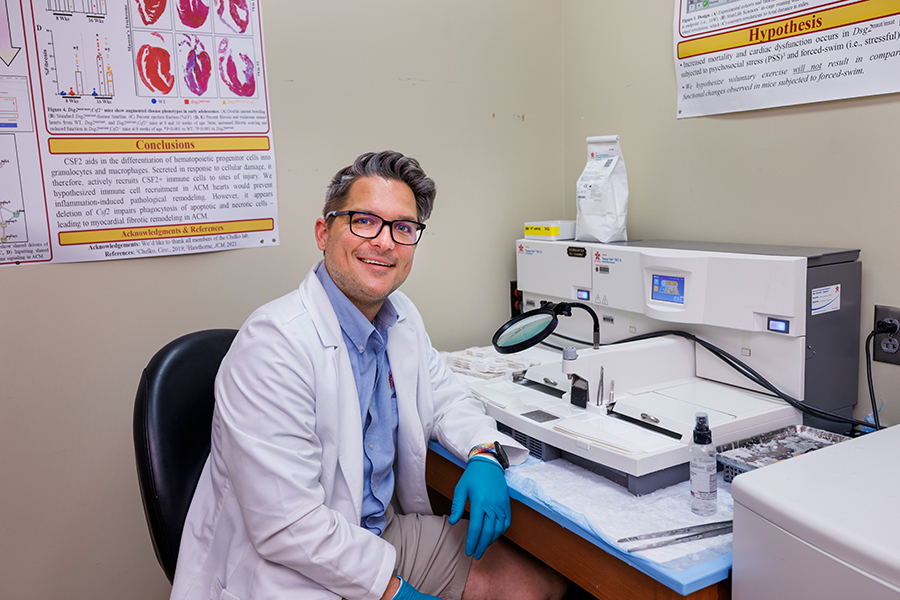FSU medical expert available for insight on Florida’s Cardiac Emergencies Bill

A new law is putting a focus on cardiac emergency response in Florida school districts.
Known as the Cardiac Emergencies Bill, HB 1607 will go into effect on July 1, 2025. It requires all Florida schools to have automated external defibrillators (AEDs) to respond to cardiac emergencies and for school district employees to have basic training in first aid, including cardiopulmonary resuscitation (CPR).
According to the American Heart Association, approximately 70% of children survive cardiac arrest in schools with AEDs. The survival rate is seven times greater than the 10% of people who survive cardiac arrest outside of a hospital in the United States each year.
Dr. Stephen Chelko, a Florida State University Assistant Professor of Biomedical Sciences at the College of Medicine, is an expert in arrhythmogenic cardiomyopathy — a familial heart disease characterized by cardiac dysfunction, arrhythmias and myocardial fibrosis. It is often referred to as “sudden cardiac death,” occurring more often in young people.
His related areas of expertise include hypertension, heart failure, cardiovascular physiology, molecular cardiology and electrocardiography.
Dr. Chelko believes HB 1607 is a critical bill that equips schools to handle sudden cardiac events that are reliant on fast-acting safety procedures.
“I have never been prouder of my state,” he said. “Sudden cardiac death is not an easy topic to discuss, particularly when it concerns our children. Yet, children are still susceptible to sudden cardiac events, and thus requiring schools to install these life-saving devices was a welcomed revision to HB 1607.”
For insight into cardiac emergencies and the impact of this legislation, media may contact Dr. Chelko at stephen.chelko@med.fsu.edu.
Dr. Stephen Chelko, assistant professor of biomedical sciences, Florida State University College of Medicine
As an expert in sudden cardiac death, how do you expect HB 1607 to impact survival rates?
“It will save thousands of lives. According to the Florida Department of Health, in 2023, Florida averaged almost 216 heart-related deaths per 100,000 citizens. Over 60% of heart-related deaths are the result of sudden cardiac death (SCD), suggesting that 30,000 Floridians may have died as a result of a fatal arrhythmic event. Less than 10% of people who experience a sudden cardiac arrest will survive unless life-saving interventions are implemented within minutes. While CPR is critical in maintaining blood flow following a sudden cardiac event, the most effective intervention is deploying an automated external defibrillator (AED). Without these life-saving devices, the chances of survival decrease by 7-10% every minute.
“HB 1607 will immediately address these devastating numbers and act to combat SCD in Florida schools. If this legislation can realize even a 10-20% impact following its implementation, then it has the potential to save 3,000 to 6,000 lives per year in our state. The provisions within the law, such as requiring certain staff and faculty to be trained in CPR, basic life support (BLS) and first aid, will have a long-term impact within our state and the greater public. By educating a broad population of school staff and faculty on how to respond to sudden cardiac events, these additional provisions will generate a pool of trained individuals throughout the state that may save countless lives, not just in Florida schools, but also in our communities.”
What are some of the most important data points based on your research of sudden cardiac death?
- Time to provide aid is key! Not all sudden cardiac events will result in death. Aid should be administered immediately! Providing CPR and/or CPR/AED increases survival if administered within 2-3 minutes. If you are waiting for someone to bring you an AED, start chest compressions and don’t stop until emergency services arrive.
- Frequency is underappreciated. I am not saying that SCD is underreported, but in my opinion, I don’t think people realize how common sudden cardiac events are throughout the population.
- Sudden cardiac events can occur in individuals with no history of heart disease. This underscores the importance of accessible AEDs and CPR/BLS training for individuals that are tasked with educating one of Florida’s most valuable assets — our children.
The post FSU medical expert available for insight on Florida’s Cardiac Emergencies Bill appeared first on Florida State University News.
Latest All News
- The Big Story: June 9, 2025A multi-university team found that modern birds were nesting in the Arctic in the Cretaceous period. That work scrambles previously known timelines about when birds began […] The post The Big Story: June 9, 2025 appeared first on Florida State University News.
- FSU’s School of Dance preserves legacy of modern dance pioneers through costume collectionThe post FSU’s School of Dance preserves legacy of modern dance pioneers through costume collection appeared first on Florida State University News.
- FSU Gives Researchers Access to Historical Costume CollectionThe post FSU Gives Researchers Access to Historical Costume Collection appeared first on Florida State University News.
- Student Star: Chris MarleyThe post Student Star: Chris Marley appeared first on Florida State University News.
- Gerald CianiWhile visiting his brother on Florida State University’s campus, Department of Chemistry student Gerald Ciani knew FSU was the place […] The post Gerald Ciani appeared first on Florida State University News.
- Florida State University expert available to discuss research related to Alzheimer’s diseaseJune is Alzheimer’s & Brain Awareness Month — a time to reflect on the importance of brain health and understand […] The post Florida State University expert available to discuss research related to Alzheimer’s disease appeared first on Florida State University News.








